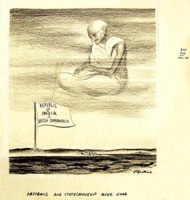Statesmanship
From Nordan Symposia
Jump to navigationJump to searchThe printable version is no longer supported and may have rendering errors. Please update your browser bookmarks and please use the default browser print function instead.
- Date: 1592
Definitions
- 1 : one versed in the principles or art of government; especially : one actively engaged in conducting the business of a government or in shaping its policies
- 2 : one who exercises political leadership wisely and without narrow partisanship
Description
A statesman is usually a politician or other notable public figure who has had a long and respected career in politics or government at the national and international level. As a term of respect, it is usually left to supporters or commentators to use the term. When politicians retire, they are often referred to as elder statesmen.
Statesmanship also conveys a quality of leadership that organically brings people together and of eldership, a spirit of caring for others and for the whole.
The words statesman or stateswoman are applied loosely to any head of state, any senior political figure, or anyone who in a given moment exhibits a certain quality of statesmanship.
Quotations
- Aristotle – "What the statesman is most anxious to produce is a certain moral character in his fellow citizens, namely a disposition to virtue and the performance of virtuous actions."
- Otto von Bismarck – "I consider even a victorious war as an evil, from which statesmanship must endeavor to spare nations."
- James Freeman Clarke – "A politician thinks about the next elections — the statesman thinks about the next generations."
- Mikhail Gorbachev – "What is the difference between a statesman and a politician?... A statesman does what he believes is best for his country, a politician does what best gets him re-elected"
